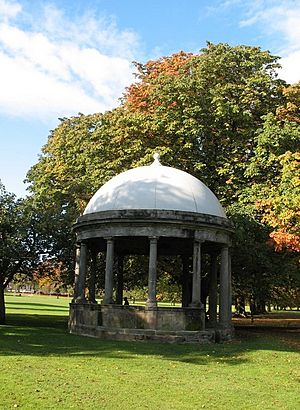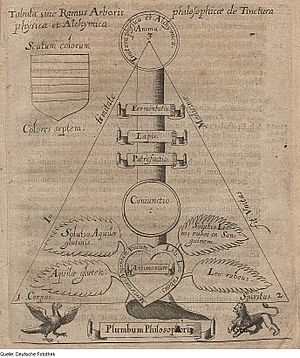Edmund Deane facts for kids
Quick facts for kids
Edmund Deane
|
|
|---|---|
| Born | 1572 |
| Died | c.1640 |
| Nationality | English |
Edmund Deane (born 1572, died around 1640) was an English doctor and writer. He is best known for his important work on the chemistry of mineral springs. He also edited old writings about alchemy.
Life of Edmund Deane
Edmund Deane was born in Saltonstall, a place near Halifax, West Yorkshire. His brother, Richard Deane, later became a bishop. Edmund was baptized on March 23, 1572.
He went to Merton College at Oxford University in 1591. He earned his first degree in 1594 and a master's degree in 1597. In 1601, he got his license to practice medicine. He continued his studies and became a Doctor of Medicine in 1608. After finishing his education, he moved to York and started his medical practice there.
Edmund Deane passed away in 1640. He was buried in St Crux Church, York.
Spadacrene Anglica (1626)
Deane wrote an important book called Spadacrene Anglica, or the English Spa Fountain in 1626. This book was about the special spring waters found in Harrogate. These waters were known for their sulfurous smell and were thought to have healing powers. Many doctors, including Deane, recommended them.
The Tewit Well in Harrogate became famous around 1571. People wanted to make the "English Spaw" (as it was called) a popular place for health. In 1625, Deane and another person named Michael Stanhope visited the well. They cleaned it and took samples of the water. Deane argued that drinking these waters in England was safer than traveling to other countries for similar treatments.
His book, Spadacrene Anglica, described how to test the waters chemically. This included using a "gall test," which was an early way to check the water's properties. This was one of the first times such chemical analysis was mentioned in English writings. Other doctors continued this tradition of testing the waters.
Deane also mentioned other wells near Harrogate. He knew about popular wells like St Mungo's Well at Copgrove and St Robert's Well at Knaresborough.
Alchemy and Writings
Edmund Deane also worked on old writings about alchemy. Alchemy was an ancient practice that combined chemistry, philosophy, and magic. People who studied alchemy often tried to turn common metals into gold or find a way to live forever.
In 1630, Deane edited and published a collection of Latin writings by an alchemist named Samuel Norton. This book was published in Frankfurt, Germany.
 | Claudette Colvin |
 | Myrlie Evers-Williams |
 | Alberta Odell Jones |



